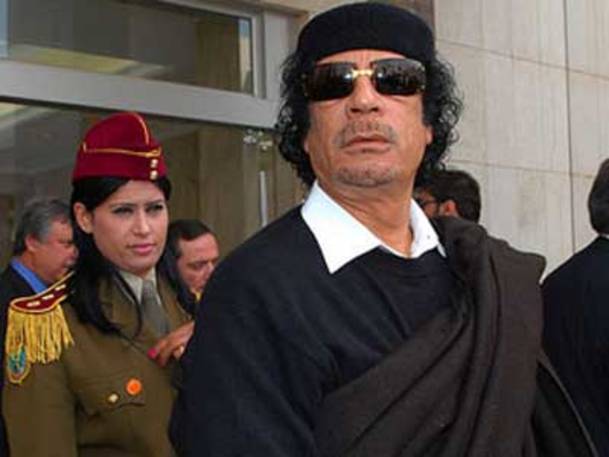


This first ever visit to the Belpaese was an important event, because it represented the end of decades of animosity between the two countries. In fact, formerly part of the Ottoman Empire, Libya was occupied by Italy in 1911, before becoming officially its colony in the 1930s. The country gained independence in 1951.
The visit had at its basis serious issues such as the treaty signed by Silvio Berlusconi and Muammar Ghaddafi in 2008, in which Italy profused apologies for colonial era abuses and agreed to pay a 5-billion-U.S.-dollar compensation agreement to make amends for Rome’s 1911-1941 colonial rule. In return Italy had benefits obtaining greater rights to Libyan oil and gas and the consent for Italian navy patrols off the Lybian coasts to block the boats of clandestine immigrants across the Sicily channel.
Despite the peaceful intentions of the visit, though, the visit of the Libyan leader was full of polemic attitudes created by both sides. First of all, since his arrival at the Ciampino airport, Muammar Ghaddafi showed well on display on his uniform, together with all his military decorations, a picture of a legendary resistance hero, Omar al-Mukhta, whom Italians occupiers hanged in 1931. This visual provocation was apparently denied through words, as the Libyan leader during the official meetings hailed the former colonial ruler for apologizing for its past.
Another problem was created by the unusual accommodation of Muammar Ghaddafi who has the habit to pitch a Bedouin-style tent in every capital he visits. The chosen location was the XXVII’s century Villa Doria Pamphili park and this decision stirred up the reactions of the residents in that area, who could not accept to live, even though only for a few days, in a quarter paralyzed by a tight security blocking every activity around Ghaddafi’s portable chateau.
The most upset to find the park inaccessible were all those making a daily jogging and the many proprietors of dogs, who could not accept to change their daily schedule. Ghaddafi was guarded during all his meetings by the so-called "Amazons," a group of several dozen well-outfitted female bodyguards from Tripoli, in green fatigues and red berets, who did not leave him alone for a moment. Even at the famous restaurant Il Bolognese in Piazza del Popolo where he arrived one evening, almost at ten, escorted by forty people, including bodyguards and assigned to ceremonial, among whom outstood the head of his Amazons who is with him round the clock. Colonel Ghaddafi ate in a small room that can contain ten people, while the rest of his train was sitting in tables out of the restaurant. Piazza del Popolo was closed to the public, stirring up protests of Romans and tourists there for a simple evening walk. In the meantime the Libyan leader was tasting the famous homemade tagliatelle and branzino cooked in the oven. Of course he also accepted to have photos with the proprietor of the restaurant, Alfredo Tomaselli.
At 11.30 Ghaddafi, as a perfect tourist, despite all the people accompanying him, visited Piazza di Spagna. A real must that could not be missed in his agenda! During his first-ever visit to Italy, Ghaddafi met in Rome with Premier Silvio Berlusconi, President Giorgio Napolitano, ministers, politicians and businessmen, receiving a red carpet treatment. Though, the protests could not be hidden. First of all, not all Italians agree with the lack of democracy in Libya where, according to the protesters, human rights are not respected. The demonstrators were also against the bilateral agreement for Italy to send back boatloads of African migrants crossing the Mediterranean. They were outside of La Sapienza University, trying to stop him giving a lecture, hurling paint and scuffling with police. Ghaddafi told the students terrorism was “the residue of colonialism.” He condemned terrorism, and couldn’t resist in adding a reference to the U.S.: “What’s the difference between the U.S. airstrikes on our homes and bin Laden’s actions?,” he said, making a comparison between 9/11 to U.S. attacks on Libya in 1986, which killed 41 people including Ghaddafi’s adopted daughter, following a terror attack that killed three American soldiers at a nightclub in Germany. Ready to reply to such statement was an embarrassed Foreign Minister, Franco Frattini: “Just because we play host to Muammar Ghaddafi doesn’t mean we agree with everything he says.”
Source URL: http://test.iitaly.org/magazine/focus/facts-stories/article/ghaddafis-historical-and-unusual-visit-italy
Links
[1] http://test.iitaly.org/files/gaddafi1245198772jpg